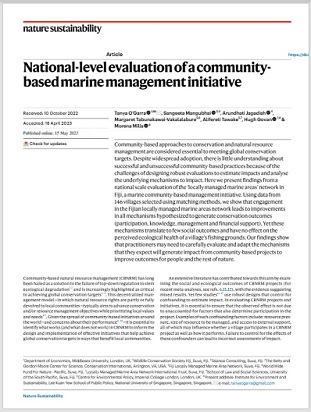
Community-based approaches to conservation and natural resource management are considered essential to meeting global conservation targets. Despite widespread adoption, there is little understanding about successful and unsuccessful community-based practices because of the challenges of designing robust evaluations to estimate impacts and analyse the underlying mechanisms to impact. Here we present findings from a national scale evaluation of the ‘locally managed marine areas’ network in Fiji, a marine community-based management initiative. Using data from 146 villages selected using matching methods, we show that engagement in the Fijian locally managed marine areas network leads to improvements in all mechanisms hypothesized to generate conservation outcomes (participation, knowledge, management and financial support). Yet these mechanisms translate to few social outcomes and have no effect on the perceived ecological health of a village’s fishing grounds. Our findings show that practitioners may need to carefully evaluate and adapt the mechanisms that they expect will generate impact from community-based projects to improve outcomes for people and the rest of nature.












